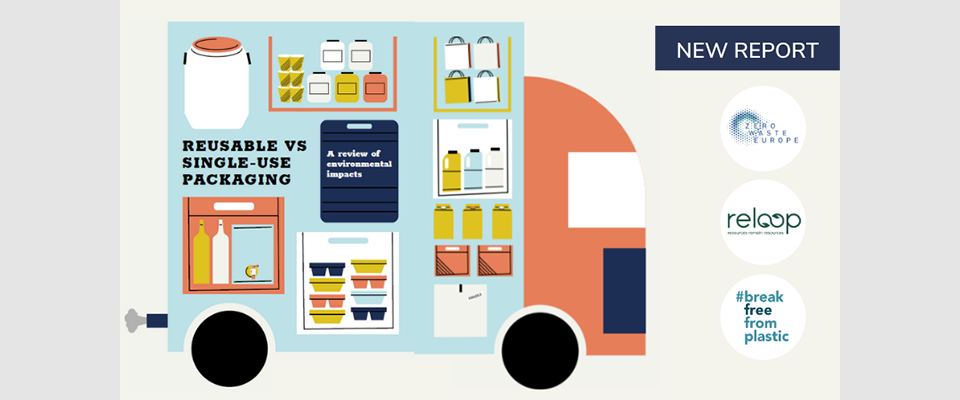Today, Zero Waste Europe and Reloop, in partnership with the University of Utrecht, released a report showing that reusable packaging – such as bottles, crates, jars, and others – produce far fewer carbon emissions than their single-use counterparts.
The “Reusable vs Single-Use Packaging: A Review of Environmental Impact” study compares 32 Life Cycle Assessments (LCAs) of 11 different types of packaging, analysing their environmental impact at different stages of the product’s life. This includes parameters such as production, transport, number of reuse opportunities, and end-of-life treatment.
Among its key findings, the report shows that:
Reusable glass bottles produce 85% fewer carbon emissions than a single-use glass bottle, 75% fewer carbon emissions than plastic (PET), and 57% fewer carbon emissions than aluminium cans.
Likewise, a reusable plastic crate produces 88% fewer carbon emissions than a single-use cardboard box, 64% fewer emissions than a box made of mixed materials, and 5% fewer emissions than a wooden crate.
The way packaging is transported, including distance and mode of transport, has the biggest effect on a piece of packaging’s environmental impact.
The report also identifies key measures to improve the environmental sustainability of reusable packaging. This includes standardisation of packaging, implementation of deposit return schemes, and changing how the packaging is transported – all of which can bring down the carbon emissions of reusable containers.
Larissa Copello, Consumption & Production Campaigner at Zero Waste Europe said:
“The report reinforces the need to stop looking at packaging as an essential asset to a product, and to start focusing on efficiency and rethinking the current way of delivering products to consumers. While the COVID-19 pandemic has hit our society in a hard way, it has also created momentum for policy-makers to act and move away from the current overpacked culture and towards more conscious production and consumption.”
Clarissa Morawski, CEO at Reloop, said:
“This report shows that there is not a zero-sum choice between reducing carbon emissions and reducing waste when it comes to saving the planet. Urgent and innovative measures must be introduced to encourage the use of efficient reusable containers while reducing the impact single-use containers have on the environment. The findings tell us that extremely high collection rates are the key to improving the carbon footprint of reusable and single-use packaging. Governments must now introduce mandatory measures that require packaging producers to achieve these rates, so that effective solutions, such as deposit systems for beverage containers, can deliver benefits for both the economy and the environment.”
Source : Zero Waste Website
Zero Waste Europe is the European network of communities, local leaders, experts, and change agents working towards the elimination of waste in our society. We advocate for sustainable systems and the redesign of our relationship with resources, to accelerate a just transition towards zero waste for the benefit of people and planet. www.zerowasteeurope.eu






